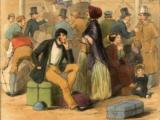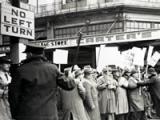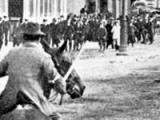Violent clashes between unionised waterside workers and non-union labour erupted two days after Wellington’s ‘wharfies’ held a stopwork meeting in support of striking shipwrights.
Workers Rights
Events In History
At a meeting in Wellington, Marianne Tasker and supporters established a domestic workers’ union, hoping to use the Liberal government’s Industrial Conciliation and Arbitration Act to force employers to improve pay and conditions. Central to their demands was a 68-hour working week.
The first Labour Day celebrated the struggle for an eight-hour working day. Parades in the main centres were attended by several thousand trade union members and supporters.
Articles
British & Irish immigration, 1840-1914

Who were the ancestors of Pākehā New Zealand? Where did they come from and what sort of people were they? These are some of the questions which this feature sets out to answer. Read the full article
Page 8 - Who were the immigrants?
Graph of figures taken from the death certificates of British and Irish immigrants to New Zealand (which include information on the father's
Labour Day

Celebrated on the fourth Monday in October, Labour Day commemorates the struggle for an eight-hour working day, a right that carpenter Samuel Parnell had famously fought for in 1840. Our first Labour Day was held on 28 October 1890, and it has been a statutory public holiday since 1900. Read the full article
Page 1 - Labour Day
Celebrated on the fourth Monday in October, Labour Day commemorates the struggle for an eight-hour working day, a right that carpenter Samuel Parnell had famously fought for in
Life in the 20th century

Exploration of everyday life in New Zealand from 1900 to the mid-1980s Read the full article
Page 2 - All in a day's work
Work structures daily life, influencing when people eat, what they wear, how they take 'time
The 1912 Waihi strike
On 'Black Tuesday', 12 November 1912, in the midst of a bitter six-month strike by miners in the small New Zealand goldmining town of Waihi, striker Fred Evans was killed - one of only two fatalities in an industrial dispute in New Zealand's history. Read the full article
Page 1 - 'Black Tuesday'
On 'Black Tuesday', 12 November 1912, in the midst of a bitter six-month strike by miners in the small New Zealand goldmining town of Waihi, striker Fred Evans was killed - one of
The 1951 waterfront dispute

The 1951 waterfront dispute was the biggest industrial confrontation in New Zealand’s history. Although it was not as violent as the Great Strike of 1913, it lasted longer – 151 days, from February to July – and involved more workers. Read the full article
Page 1 - The 1951 waterfront dispute
The 1951 waterfront dispute was the biggest industrial confrontation in New Zealand’s history. Although it was not as violent as the Great Strike of 1913, it lasted longer – 151
Page 2 - Countdown to confrontation
New Zealanders generally accepted the hardships and restrictions of the war years as necessary in the fight against fascism. After the war, though, many began to demand a greater
Page 3 - War on the wharves
With New Zealand’s vital export trade at stake when the wharves came to a standstill, the government declared a state of emergency on 21
Page 4 - Division and defeat
The watersiders’ militancy had isolated them from most unionists and Walter Nash’s Labour Party Opposition sat uncomfortably on the fence, denouncing government repression but
The 1913 Great Strike

The Great Strike of 1913 was in fact a series of strikes between mid-October 1913 and mid-January 1914. It was one of New Zealand’s most violent and disruptive industrial confrontations. Read the full article
Page 1 - The 1913 Great Strike
The Great Strike of 1913 was in fact a series of strikes between mid-October 1913 and mid-January 1914. It was one of New Zealand’s most violent and disruptive industrial
Page 2 - Class war comes to the workers' paradise 1890-1913
History of New Zealand's employment relations,
Page 3 - Outbreak of the 1913 strike
The 1913 Great Strike was sparked off by two relatively small
Page 4 - The 1913 strike in Wellington
Because the strike threatened their livelihoods, rural men were keen to volunteer as special
Page 5 - The 1913 strike in Auckland
Watersiders in Auckland began to strike in support of those in Huntly and
Page 6 - The 1913 strike in the South Island
Although the 1913 strike had its biggest impact on Auckland and Wellington, the South Island's cities and mining towns were also
Page 7 - The defeat of the 1913 strike
The seizure of the wharves in Wellington and Auckland greatly reduced the strikers’ industrial power. Similar takeovers by ‘scab’ arbitration unions soon happened in other























